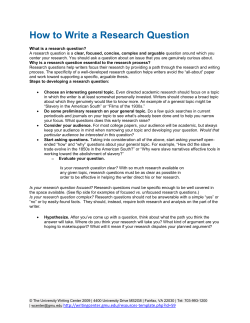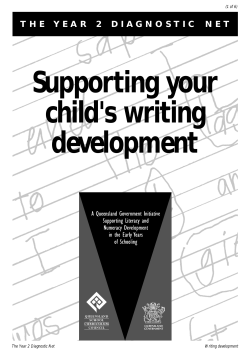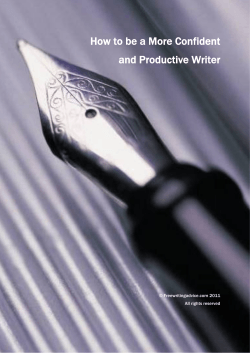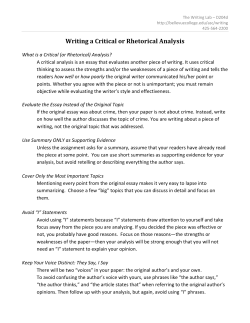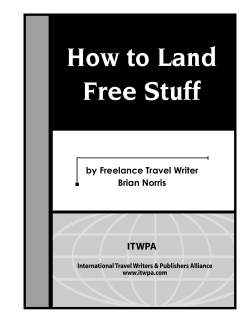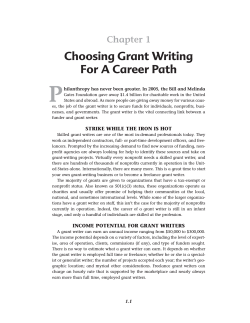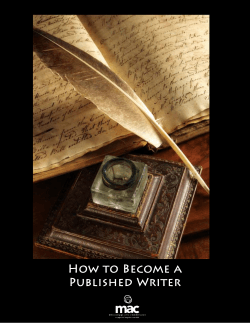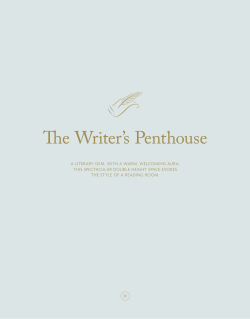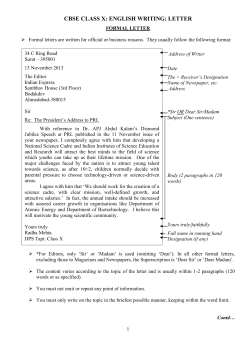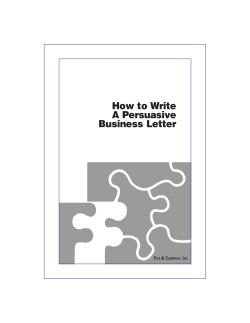
EIGHT LETTERS TO A YOUNG WRITER TEJU COLE
EIGHT LETTERS TO A YOUNG WRITER TEJU COLE 2 First published 2008-2009 in weekly installments in the Nigerian newspaper NEXT on Sunday. © Teju Cole, 2010. All rights reserved. 3 for Temitayo, an equal 4 Preface Eight Letters to a Young Writer evolved as a fictional exercise addressed to an imaginary young Nigerian writer. I thought it might be interesting to take the genre of letters to a young writer and have it be written by someone who is himself a young writer. Over the course of the series, and with the encouragement of my editor Molara Wood, I tried to move from discussions of simple writing precepts to more complex things like voice and calling. It was wonderful to write these letters for a general newspaper audience, and it was equally wonderful to receive letters from young Nigerian writers in response to them. The one-sided correspondence became a richer and truer thing. I'm happy to make those pieces available again now, as a single downloadable PDF file. I hope they can stand as a small act of solidarity with writers of all ages in Nigeria and elsewhere. 5 First Letter: Simplicity Dear friend, Let me begin with a confession: I am not qualified to give you advice. For a start, I am a young writer myself, hardly older than you, or perhaps you are even older than I am. I also recognise (as you surely recognise as well) that there are few things more resistant to tutoring than the creative arts. Most importantly, I know so little of your specific situation that in giving you any counsel, I have to restrict myself to generalities. Still, I am always trying to learn more about this writerly craft of ours, and that same instinct is at work in all writers, old and young. So, you will forgive me what follows, and perhaps in these paragraphs find one or two things that will be helpful to you. You mentioned in your letter that you are determined to write some stories. This is good news: in finding the time and space to do your writing, you will come up with something tangible. It is good to set it down. Whatever you come up with, whatever its merits, will be of more worth than even the most Shakespearean of unwritten books. There are perhaps a hundred different things I could tell you as you embark on this strange writerly journey. But let me limit myself to eight for now. Take them not as rules but as suggestions, as reminders about things that I myself wish I had known sooner. The first has to do with the texture of your writing itself: keep it simple. George Orwell’s advice, repeated numerous times, is worth bringing out again: never use a big word where a small one will do. 6 There are many who use big words to mask the poverty of their ideas. A straightforward vocabulary, using mostly ordinary words, spiced every now and again with an unusual one, persuades the reader that you’re in control of your language. Use simple words fortified by a few bigger ones, and along with this variation, vary, too, the rhythm of your sentences. Most of them should be short, but the occasional long one will give a musical and pleasing cadence to your writing. My second suggestion is that you remove all clichés from your writing. Spare not a single one. The cliché is an element of herd thinking, and writers should be solitary animals. Phrases that have been used to the point of becoming meaningless have no place in your stories. “Money doesn’t grow on trees,” “Not my cup of tea,” “Everything happens for a reason”: mildewed language of this kind is a waste of the reader’s time. Three: avoid adverbs. Let the nouns, adjectives and verbs carry the action of the story. “He smiled” is much stronger than “he smiled wickedly.” If the character is wicked, let the story show that. When you are editing, interrogate each adverb and eject any that doesn’t have a good reason to be there. Four: when reporting speech, it is enough to say “she said” or “he said.” You must leave “he chortled,” “she muttered,” “I shouted,” and other such phrases to writers of genre fiction. These extra verbs add nothing to a narrative, and only suggest to the reader that you don’t have full confidence in your art. These first four suggestions point in the same direction: aim for a transparent style so that the story you’re telling is that much more forceful. Five: read. Read more than you write. In expressing the ambition to be a writer, you are committing yourself to the community of other writers. John Berger once wrote that a quack is a doctor who 7 has failed to integrate his few insights into the general body of medical information. As a writer, whatever your insights might be, you have to connect them to what else has been done in literature. Don’t be like those who worry so much about originality that they end up writing garbage. Instead, disciple yourself to great writers. Read Mann, García Márquez, Coetzee, Joyce, and learn at their feet. Your originality will mean nothing unless you can understand the originality of others. Read slowly, like someone studying the network of tunnels underneath a bank vault in preparation for a heist. What can you steal from the techniques of the masters? Understand what Joyce is doing with language in Dubliners. Immerse yourself in the slow, taut arc of Mann’s Magic Mountain. And then (a little brashness helps) ask yourself: what can you do even better than them? Six: rely on observation. You can’t fool the reader. I remember writing poems, as a child, about snowy peaks and picnics in meadows (Chimamanda Ngozi Adichie recounts something similar of her own childhood: it must be all the Enid Blyton we both read). It is bogus to write only about mud huts and village streams if you’ve lived your whole life in Somolu or Bariga. Your environment is interesting for its own sake and Somolu is more interesting than most places. Can you perhaps do for your city what Joyce did for Dublin? I beg you: observe, observe, observe. Eavesdrop while you’re sitting in the hospital waiting room. Be ruthless in your use of what you’ve seen and what you’ve experienced. Write about the one-armed guy selling rat poison on the danfo, or what happened when the day your estranged aunt came to visit. To all these add your imagination, so that the line where invention ends and reality begins is undetectable. “It’s just like a memoir” is the highest praise anyone can give your work of fiction. And if anyone asks whether you really did put trace amounts of rat 8 poison in your uncle’s amala, simply smile and shrug. Begin your stories in observation, then let invention take over. Seven: be courageous. Nothing human should be far from you. Write about murder and exam cheats; about depression and borrowed money. Write about the senator who lives in constant fear that her thievery will be found out, or the grandmother who wants to sleep with her son-in-law. What about the imam who realises one Friday afternoon that he’s become an atheist? What of the anti-gay activist who himself is secretly gay? Tell the story you need to tell. Remember that you are not writing for the moral improvement of your reader. Leave that to others. You are writing so that you and the reader can share a solidarity in the complications of the human condition. Eight: avoid writing narratives that have only a single meaning. When you write about the dishonest senator, write it less as a denunciation of corruption (that is boring, everyone denounces corruption; even the senator herself denounces corruption, as she stuffs more money into her bag) and more as a study of what it’s like to be a thief and to live in fear of being found out. If you can persuasively evoke the brittleness, jumpiness, and false confidence of a thief, you will have succeeded. These are eight ideas. I could give you another eight, but I must pause here. These suggestions, you should understand, will be of no value to you unless you have the inner fire to really follow writing wherever it leads you. If you have that fire already, and I believe you do, if you’re ready to stay up late at night to do the work, if you’re truly willing to shuttle between reality and the dreamworld like a courier, then you won’t be discouraged when you hit the inevitable roadblocks. You’ll write not because you want to but because you must. 9 Consider this: “Perhaps it will become apparent to you that you are indeed called to be a writer. Then accept that fate; bear its burden and its grandeur, without asking for the reward, which might possibly come from without.” Those are Rilke’s words. They should be yours, too. best, TC 10 Second Letter: Freedom Dear friend, You will forgive the inconstancy of these missives: I remain hesitant to give advice. But I think of how nice it would have been had someone pointed out some of these things to me when I was younger. Whenever I read James Joyce’s perfect collection of short stories, Dubliners, the little marching band of envy arrives outside my window, and I wish that I had had such genius in my early twenties. That dream is gone for me now. But for you, perhaps it isn’t too late. Of course, it isn’t my advice that will carry you from here to there. Your own talent and inner drive are what matter. In any case, I was delighted to hear from you that you found some of the ideas in my letter helpful. Good! Of far greater importance than the specific technical matters, I was glad to know that this kind of conversation, between a young writer and an even younger one, is positive. I took pains, when I wrote you, to distinguish between suggestions and rules. Suggestions are there to be rejected, and you should reject any of them you wish to: my only plea to you is that you understand, as comprehensively as you are able, what it is that you are rejecting. It will not be difficult at all for you to find wonderful writers, wonderful artists of the written word, who disregard some of the suggestions I gave you. All I will say to that is that you should consider those artists not only from the point of view of their perfected work but from the 11 perspective of their apprenticeship. A pianist who plays angular, atonal, but nevertheless beautiful pieces must have started, at some point, with scales and chords. She must have learned to read music, and gotten a sense of how composers put their work together. But once that mastery was properly achieved, she was able to deliver herself into an interesting freedom. This is the heart of the matter: not an untutored freedom, but a freedom that contains something interesting. To imitate the gestures of the avant-garde, to write frantic prose, does not guarantee that one has the insight of the avant-garde. There’s much “radical” work done by uninteresting writers. But even for good writers, writing is mostly failure: it is rare for a writer to reach the mark she has set herself. The question is whether this failure is productive or not. Remember Beckett: “Ever failed. No matter. Try Again. Fail again. Fail better.” If your writing is falsely experimental, then you haven’t given yourself a chance to learn from your mistakes. The mistakes, swallowed up by too brash a style, become opaque. Such mistakes can sit there immobile for years, like unexploded land mines. So try not to fail worse. Fail better. But let me turn this around and share a story about doing things exactly the way you want to do them. It’s a story told by the nowforgotten Czech author Josef Kainar: A boy and his grandmother go out for a walk in town. The grandmother is blind, and the boy leads her by the hand. But this boy is a little impish, he has a bit of Esu in him, and every now and again, he cries out (just for fun): “Watch out, Grandma! There’s a stone in the path.” Or “Careful about that root near your left foot.” And the poor old lady hops and skips, thinking she is on a forest trail. Passersby 12 scold the boy for being wicked, but what does he say? “She’s my grandma, not yours, and I’ll treat her any way I want.” Terrible! But what was Kainar’s point in telling this anecdote? That your independence as a writer is your own: do with it exactly what you want. Be fierce with it, and feel free to do things that might confuse others. Writing is your “grandma,” and you can treat her any way you want. This is a freedom that is uniquely an artist’s. A policeman can’t, or at least shouldn’t, do anything he wants; an accountant can’t, or in any case shouldn’t, go breaking the rules. But having committed to such a radical idea of freedom, having declared that you’re no policeman or accountant, that you’re not stymied by procedural limits, you owe yourself an interesting result. Make sure your inner compass is functioning well, and there’s no better calibration for this than to spend time with those greats, past and present, who have trod the same lonely path as you have, who have, in a sense, been accused of being mean to their grandmas. I was particularly pleased to hear that you’re currently reading Gabriel García Márquez. For me, he’s one of the most remarkable among living novelists. In fact, the depth of his creativity is such that he is almost worthless as a teacher. What can one learn from One Hundred Years of Solitude or Love in the Time of Cholera? The great risk— a risk that many fall to—is that only the surface effect, the so-called “magical realism,” is retained by those who try to learn from him. In the past two decades we have had a surfeit of copycat magical realism books. Most of them are bad. These authors don’t understand that García Márquez’s real strength isn’t in the miraculous appearance of butterflies or levitating maidens. It is in his understanding of human nature. The beauty of his writing is like a tough husk that keeps me 13 from the delicious kernel of his literary tactics, but I believe I might have snagged one small insight: he writes of human behaviour as though he had no interest in “wrong” or “right.” Characters do shocking things, not because the author wishes to shock but because it is in the character of humans to misbehave (even when, in general, they are good people). García Márquez has the ability to write this in a way that makes it seem normal; this helps us trust him. He doesn’t judge his characters, and as such we feel that he won’t judge us, his readers, either. As for your own story, which you generously sent to me, I think it is beautifully written. The prose is clean and direct. I will only ask, as though I were a police investigator, for more names, more addresses, more places, and even dates. I am disinclined to take my eba with only watery stew. I need to see some ponmo in there, some cow foot, and some liver if possible. In your fiction, give lots of meat, enliven things with proper nouns. “Town”—which town? “Market”—I want to know which market. “Their house” should be described in such a way that I will know what bus to take there, or that I will at least have the impression that I do. This isn’t a rule for all stories, and there’s certainly a place for parable-like narratives, but I feel that the story you’re trying to tell will benefit from being made more precisely local. If you are withholding information, there should be a reason for it, not simply that you couldn’t be bothered to name the town or the market. The trick of it will be to give information, when you give it, in a way that feels organic. As far as this goes, what I often want to tell young writers is: there’s no need to tell us everything in the first paragraph, or even on the first page. 14 The facts should be worked into the texture of the story. That way, the reader feels not only that he has read a story “about” something but that he has been transported into a specific place; so specific, in fact, that he’s sure you must have been there yourself. My aburo, I wish you continued insight. And I hope you and I will both continue to fail better—failure of a kind that might even be better than certain forms of success. best, TC 15 Third Letter: Voice Dear aburo, In the first of my letters to you, I spoke about clarity of sentences, avoidance of cliché, and other such basic matters. I think that these are suggestions that anyone can follow and, in so doing, come up with something readable. But mere readability shouldn’t satisfy you. There are books you have read that left you with only astonishment. There is some part of you, perhaps, that wishes to recreate that astonishment in your own readers. How does one get there? Well, if I knew that, I would be so busy collecting prizes that I wouldn’t have time to write to you at all! But let us explore the question… For centuries, writers have tried to figure out how to match story to mood and expression. Some have focused more on plot, others have expended their energies on rhetoric, and others yet believe that the secret is in the length of the book or in its title. In my view, one of the things that matters most is voice. Great writers know all about it, and ordinary writers ignore it. But what, exactly, is voice? Writing is silent: mute ink on a flat page. Writing has no volume, no timbre, no accent, no actual sound, and when we read, the only voice we hear is the imaginary one in our own heads. But we “hear” something when we read the following: “Okonkwo was well known throughout the nine villages and even beyond. His fame rested on solid personal achievements.” 16 From these two short sentences, we can make the educated guess that the speaker is some sort of insider. The voice feels older, much older than the twenty-eight-year-old author who wrote those lines in 1958. The narrator, we surmise, knows enough about the nine villages to be able to say what does and does not constitute “solid personal achievements.” But what is interesting here is that the narrator doesn’t say, “I know enough about the nine villages…blah, blah, blah.” The narrator’s authority is something we pick up from the voice. We have a notion not only of Okonkwo’s prowess but of the narrator’s opinion of that prowess. The plot of a given novel might not kick in until page fifteen, or page fifty, or it could even turn out to be an excellent but plotless book. But one thing that’s always there, right from the opening lines, is the voice. When we are speaking to someone in real life, we use many nonverbal hints to help get our point across. Our faces give away a great deal—flaring nostrils and darting eyes; the tempo of speech, the inflections, the slight modulations of accent. But such cues are not present in writing. They must be brought into the text as unobtrusively as possible. Listen to this: “Many years later, as he faced the firing squad, Colonel Aureliano Buendía was to remember that distant afternoon when his father took him to discover ice.” What can we tell, from the voice, about the kind of story being told here? It is a similar voice to Achebe’s, in that it seems to be drawing on a collective memory; but this is a more intricate and more playful voice; it is gossipy, flipping between distant future and distant past, and eager to press a yarn into your willing ears. That initial suspicion will be borne out by the rest of the book: One Hundred Years of Solitude delights in weaving in and out of itself, playing with time, and introducing outrageous characters. 17 Another example, also from the first page of a novel: “If you really want to hear about it, the first thing you’ll probably want to know is where I was born, and what my lousy childhood was like, and how my parents were occupied and all before they had me, and all that David Copperfield kind of crap, but I don’t feel like going into it.” Well, this one is quite different, but as with Achebe and García Márquez, what J.D. Salinger is doing here is more than simply giving us information. He is telling us what kind of narrator we are dealing with. The narrator, is named Holden Caulfield, and he is funny and impetuous, but there is also more than a hint of sadness in him. It could be a single word or a phrase—in this case, the self-defensive “I don’t feel like going into it”—that opens up an entire new dimension to the work. I love the way Adichie’s Purple Hibiscus begins: “Things started to fall apart at home when my brother, Jaja, did not go to communion and Papa flung his heavy missal across the room and broke the figurines on the étagère.” The facts, from the foregoing, are that a boy named Jaja is in trouble with his father and that the dispute has to do with religion, but what else has Adichie hidden in there? For one thing, there is the obvious reference to Things Fall Apart. And then there is that strange word at the end—”étagère”—which makes you raise your eyebrows and say, “Who is telling this story, and why has she chosen such a peculiar word? Why doesn’t she just say ‘shelf’?” So you read on, as much for the story as to figure out how the mind of the narrator Kambili works. And isn’t it just like a bright fifteen-year-old to say “étagère,” if for nothing else that to warn you that she’s welleducated and not to be trifled with? So, aburo, as you set out to write your story, be aware that it is very much a matter of voice. Ursula K. LeGuin has written that “the 18 story is not in the plot but in the telling.” What all great works have in common is that the voicing is secure. There is evidence, throughout, that how the tale is being told is precisely how the author wishes it to be told. In fact, I suspect that voice is not simply the way you tell the story, but rather it is itself where the story comes from. The novel I have just written began with a voice—an intelligent, sorrowful, but self-deceiving voice—and it was from this voice that the entire book itself emerged. It is likely I will return to this matter of voice in some future letter to you, but I hope these thoughts are useful as you translate that tale in your head into ink on the silent sheet. best, TC 19 Fourth Letter: Inwardness Dear friend, In my letters to you, I’ve been discovering for myself a way of talking about the practice of writing, a way of talking about things I find only in the writing itself. In what follows, I am of course addressing you, but I am also addressing myself. This is apt, since the subject we have been discussing is literary voice. One of the first questions that arises when we talk about voice is: To whom is the writer, in the guise of a narrator, speaking? The obvious, but somewhat unhelpful, answer is “you”—you the reader in general, whoever you might be. The book is addressed to the person who bought the book, or took it out of a library, or found it abandoned at a bus stop. In that sense, most texts are promiscuous. They don’t give a damn who reads them, so long as they are read. But have you experienced the sensation of a text that felt like it was targeted not to a general reader but to you in particular? Have you felt, at times, a sort of pact between you and the writer? It is an amazing thing. I think this is part of what the Turkish novelist Orhan Pamuk is describing when he writes: “To read a dense, deep passage in a novel, to enter into that world and believe it to be true—nothing makes me happier, nothing binds me more to life.” He also adds, impishly, “I also prefer it if the writer is dead, because then there is no little cloud of jealousy to darken my admiration.” 20 What I am trying to describe here is like a magician’s sleight of hand. It is impressive when it is done well, literally breathtaking sometimes, but an observer can only guess at what is actually being done. The hands that were bare a moment ago now appear to be generating white doves out of thin air. It is the same with a gifted writer. How does she seemingly climb into our heads—and not even “our heads” but “my head,” because it feels so personal, so specific— without actually knowing us or our circumstances, and from that vantage point proceed to unfold a narrative that we are certain was written only with us, only with me in mind? I don’t know how it is done. It isn’t taught in any school, not even in the schools of writing. But here’s my guess: the writer takes us into her confidence, but does it without appearing to do so. This invitation into the writer’s thoughts is there in all works that really get under the reader’s skin. It is there regardless of whether it is a writer we identify with or not; it doesn’t matter whether the writer is female or male, old or young, whether the story we are reading is written in the first person or in the third. Now, if you are reading a romance novel or a thriller, all of this is irrelevant. There are certain plot points that are followed, the language is kept moving and, if you like reading such genre works, your adrenalin carries you through to the finish. Afterwards, you feel like you have experienced a good love story or an action film. You won’t necessarily feel that the characters or situations in the book brought you to a more profound understanding of the human condition. This is because genre writing usually deals in stereotypes: the banker, the spy, the beautiful widow, the handsome new cattle rancher, characters who are of interest only insofar as they contribute to the plot. 21 There’s nothing whatsoever wrong with any of this, but it is writing that skims the surface, entertains you, and is gone from your life. In serious writing, the writer goes one extra step, and by taking the gamble of including “you in particular” must perforce exclude other, perhaps more casual, readers. This is the price the writer must pay for achieving an interesting voice, a voice that captures and earns your serious loyalty. If there’s any book you feel has entered your head, you can be sure that there will be other readers who say, “I found it boring” or “I didn’t know what she was talking about.” By way of example, I remember the first time I read Disgrace, by J. M. Coetzee, a few years ago. The story is told in the third person, but the “he” of the story, David Lurie, might as well be a first-person narrator, so close does Coetzee bring us to his thought processes. What was it about this story of life in post-apartheid South Africa that so startled me? Three days after reading the book, I was in the shower when I felt a sudden sob rise in my chest. The story is sad, yes, but I don’t think this was why the book had such an impact on me. Some have complained, not unjustly, about the characterization of the black characters in the book. Nevertheless, Disgrace haunted me like few other books have ever done. It was the voice. David Lurie’s voice sounded, at crucial points, like my own voice, like the story was being told in a kind of code I alone would understand. But Lurie is a late middle-aged English professor in Cape Town, a white man, divorced, a bitter man, a frequenter of prostitutes, a man who makes passes at his students, an aggravatingly complacent individual. He isn’t remotely me. But because his thought process is ambivalent and stubborn, because he is so annoyed by a disciplinary panel at the university where he works that he is willing to wreck his own career, because he does this with an 22 irritation that, through the author’s precision, I could almost feel as mine—for all these reasons, David Lurie became sympathetic to me, the reader, and I thought, “Coetzee has written this with me in mind.” And I think he has done it by taking a set of reactions that exist but are not universal, and weaving them into the story. Is that a general principle we could put into our own writing, you and I, to better bind the reader to life? To place at the heart of a story a voice that is neither so vague that it applies to everyone, nor so eccentric that none can relate to it: a worthwhile challenge, don’t you think? The struggle continues. best, TC 23 Fifth Letter: Artistry Dear aburo, It is an accident of classification that writers think of themselves simply as writers. Writing is the specialised tool through which something happens but that “something” is superior to the form of its expression, and it is held (or sought) in common with those who have different ways of expressing it. It is almost too obvious to need saying, yet we so often lose sight of it that it does have to be said: artists, in whatever medium, are after the same thing. All artists are after that thing that resists expression. If you remember your secondary school biology, you’ll recall a little bit of the mechanism of gene expression. The form of the genetic material—in the case of humans the twinned strands of DNA—is constant. The polymers are organised into a double helix. It is the information carried in that DNA, the genes, that are expressed differently. When I sit down to create a story, my concerns are expressive: I use words, I listen for the rhythm of sentences, I check my grammar and pacing, and so on. But I’m also trying to find the structure of the DNA of that particular story, trying to identify its double helix. As a young writer and—in fact, as a writer of any age—I think it is essential to find out what you can learn from other arts; your talent cannot exist in isolation any more than a human being can live healthily on one type of food alone. What arts you choose to learn from 24 are up to you. In approaching them, however, you will find that your vision is sometimes obscured by the form of the art itself. For instance, one might hear music simply and purely as music, as if it responded to nothing more than musical demands. And a painting, one that truly commands our attention, can sometimes seem an epitome of the discipline, unrelated to anything outside painting itself. What I try to do in my work is to find out how the gestures of various arts can be smuggled beyond their native borders, music that exceeds music, painting that exceeds painting. A while ago, I suggested to you that a novel is first and foremost a response to one having read other novels, that novelwriting exists within a tradition. Let me suggest further that a novel is also the result of having paid attention to other arts. It is a concept that can be expanded infinitely, for what we call originality is little more than the fine blending of influences. No one is going to lay claim to having discovered the use of colour to show elation, or expressing sorrow by means of pacing, or the peculiar thrill of unfolding a thematic element and varying it. These are artistic tricks that are as old as art itself. So, for now, let me simply show what I mean with some brief examples, in the hope that you will apply the concept elsewhere as you see fit. Take the sonata form, which emerged in the late eighteenth century as a way of shaping a piece of instrumental music. In listening to Mozart, Beethoven, or Schubert, what your ear is picking out is, in part, a fourpart division. There’s exposition (you declare the main melody), development (you do interesting harmonic things with that melody, taking it in different directions), recapitulation (a repeat of the exposition, but in altered form) and the coda (you end with something that is both fresh and connected to the original melody). 25 A writer could definitely make use of this in shaping a longform work. I think of sonatas when I am writing the small stories that need to fit into the texture of the overarching bigger story. Those small stories, like the musical fragments embedded in a sonata, must be harmonically connected. Let’s say you’re writing a book about a war. War represents a broken compact between communities. This theme could be subtly developed with the story of complicated love affairs, in other words, through a smaller scale examination of broken relationships. And then, perhaps, a character at one point in the novel drops and breaks her glasses. Not, mind you, a sacred calabash or an expensive vase: you have to be careful not to overload the symbolic weight. In any case, the glasses break, the relationship founders, perhaps, and a new relationship forms; and all along the war goes on. You imbue your novel with this hidden music of breakage and restoration. You could even spin it in a humorous direction, and have a character speak broken English. No one needs to know you were thinking of sonata form when you wrote all that. From film, meanwhile, one can learn a great deal about editing. Writers tend to go on and on, because paper is cheap. But film is expensive, and so filmmakers have learned the discipline of leaving extraneous bits on the cutting-room floor. A twenty-page chapter is good, it is the standard thing; but if need be, write a two-page chapter: cut into the scene, cut out of it, and be done with it. Michael Ondaatje is someone who does this very effectively: before the film of The English Patient was made, the novel itself was already like a great film, sharply edited, each scene at once luscious and slim. It’s worth learning how to move the “camera” of your mind’s eye over a written scene, taking note of what a camera would see: the 26 lighting, the small movements, the seemingly insignificant things. Then the decisive action happens and, gbosa, you cut out of it, and let it resonate in the reader’s mind. Don’t try to explain everything. Street photography, of the kind practised by Henri Cartier-Bresson, brought this idea of the decisive moment to a very high state of polish. From Cartier-Bresson, one can learn that elements such as background or setting, in combination with a key movement or instantaneous action, can be heartbreaking, can be breathtaking. All the elements click into place, and the finger clicks the shutter: you’ve captured something. When you do, you feel it in your bones. George Osodi, a great photographer of the city of Lagos, accomplishes just this: looking at his work, one sees both an ideal setting and a perfectly timed shot. That sensibility can migrate over into literature too. The American writer Eudora Welty once said: “I like the feeling of being able to confront an experience and resolve it as art, however imperfectly and briefly.” Yes, that’s it exactly. The tools for seeking that resolution are many; the lessons of artistry are to be sourced from all over. best, TC 27 Sixth Letter: Home My dear aburo, How far? Many of the thoughts I’ve set down for you about the art of writing have been general. But here I am, sharing the same Lagos air as you, and I think perhaps I should give some writing advice more specific to this city of ours. As I go out in the city, I find that leaving Nigeria is something that is on the mind of many people. Our beloved president seeks medical care outside these shores, and even in our humble practice of the arts, we often look to foreign organisations for legitimation and prizes. There are those among us writers who are convinced that going to the United States or to England would be just the thing to vault them into stardom. They are convinced that literary achievement is not possible here. There’s a perception that the institutions are over there, the readers are there, and the publishers and distribution networks are there. I hope you haven’t fallen prey to such thoughts. All those things might truly be there; but what is here are the stories. In the few weeks I’ve been in Lagos, I have gone out almost every day, covering the mainland, island and peninsula, traversing the lagoon countless times. What has struck me most is the abundance of narratives right here in Lagos. It is far in excess of what one might find anywhere else, except in similarly large and wild cities: Rio, Jakarta, Karachi. I am not expressing a mere favoritism for the city of my youth although, like the poet Odia Ofeimun, I’ll confess to being a bit of a 28 Lagos chauvinist. I am describing an objective reality: things are happening here. Tins dey occur. But to see what is happening, you need to reform your eyes. Your sensibilities have to be retrained so that they catch what others miss. This reformed vision is what will allow you to extract sorrow and beauty out of the seemingly-banal texture of the everyday. And that reformation comes about by taking the risk of being foolish, by learning to look askance at things that you know very well. In other words, look at your environment as though you were a child, or a foreigner, or an alien from another planet. An example, taken at random, from something I jotted down as I was in traffic last night: “Ahead of us, a huge SUV rolls its front wheel, in slow motion almost, into a narrow culvert by the side of the road. The problem will take a good half-hour to solve, and will probably cause some traffic congestion behind us. We drive sharply around it, catching a glimpse of the fed-up madam’s face. We move through Oyingbo market, through the spicy smoke of the suya spots. On Choice FM, Naeto C sings his hit ‘Kini Big Deal.’ Folded into the thick of the night market is a man with a smile like those you see on old statues, He is leaning against a wall. His T-shirt reads ‘The House of Sin Is Holding It.’ The time is just after 7.30. It is a Saturday night, and my heart begins a sudden race, and and catches me by surprise in the net of joy.” The lines do not constitute a masterpiece. But they do capture a lived moment, a described moment that would otherwise have vanished from the world’s record. Could you try to write something like this, even if it is this brief, daily? Where are you right now? Look outside the window. What is the built environment like? Who owns it? Who makes money from it formally? Who makes money from it 29 informally? What are its dangers? What interactions are taking place in it? It might be hard to believe that these things are interesting, but that is what your writing talent consists of: to make the ordinary interesting. In a field of unexceptional events, zoom in on the pungent detail. I want to be practical now: how are you going to accomplish this? The answer is simple: keep a journal. It amazes me how often people call themselves writers and yet fail to write. Runners run everyday, and they know that not every run is a race. Musicians play music perpetually, but not every time they pick up the guitar is a concert. Writers, meanwhile, like to wait around for inspiration to strike. Don’t wait; write! Describe, describe, describe, and find the pleasure in pinning the right words to life’s incessant stream of sensations. Your journal can be secret, and can in that form be as direct and ungoverned as you wish. But it is also good to write for an audience. To accomplish that, at least in this present dispensation, nothing beats blogging. I know that there might be some technical inconveniences to that goal in Naija, NEPA and sudden power cuts being the greatest of them. But it is eminently worth it; it is worth saving up (or begging, or borrowing) and buying a simple laptop computer. It is also worth getting a broadband modem (after some initial wahala, I’ve found that the service offered by MTN works very well). Consider this the cost of your apprenticeship: the sum total of the money you’ll spend will be only a fraction of what a creative writing course might cost you, and it would be of much greater benefit. For blogging, use one of the free services, such as Wordpress or Blogspot. The blog itself will take just thirty minutes or an hour to set 30 up. Write into it every day, or every other day. Visit other Nigerian bloggers; if you get into the network, they’ll link to your blog, or visit you, or tell their friends about the work you’re doing. Above all, resist the temptation to be trite. It’s easy to get into blogging and let lazy habits take over. We do our work always in the shadow of herd thinking. Be expansive in your descriptions. Dare to bore. Undoubtedly, you will lose those people who are after something “lighter”; Godspeed to them. But you will also find fellow travellers, all sorts of young people like yourself, in Nigeria and outside, who have serious literary ambition, and who are making use of the internet to accomplish it. That experience will make writing less lonely. A word of caution: the internet by itself solves nothing. It won’t turn a sow’s ear into a silk purse. But you have to face the reality of the times you live in: gone are the days of sending your stories or poems by post to two hundred magazines and getting two hundred rejection slips. Blogging is the way forward now. It’s the way to get noticed— but only if you have a talent worth noticing. Can you imagine if we had one hundred and fifty Lagos bloggers, each of whom was writing descriptively about his or her neighborhood every day? That’s as good a substitute as I can imagine for the daily news. If your eventual interest is in writing a novel, that regular habit of noticing and describing you environment for an audience can provide an unparalleled launching pad. best, TC 31 Seventh Letter: Interviews My dear aburo, I wrote something recently extolling the virtues of libraries. Some of their territory is now being taken over for the Internet, though it will never be a total replacement. I’m thinking specifically of literature. Of course, I’d rather turn pages in bed on a rainy afternoon, or read under the shade of a tree on a warm day, than stare at a computer screen. But sometimes what you’re after isn’t a book. It’s something shorter, something with a different kind of potency. Sometimes you want some insight into how other authors do their thing. So much of that is online now. We’re lucky to live in these times. For most of the history of writing, all readers saw was the finished work. There were no book tours, few images of the author, and certainly no radio or television appearances. The author was merely a name, and that name was attached to a body of work. But these days, authors are more available to us, more willing and able to take us into the work in a way that is different from the work itself. Interviews abound, and while they are diverting for the general reader, they represent a much greater boon for young writers: a privileged and educative view of literary alchemy. Let me confess something to you, my friend: I have spent hours and hours reading interviews with authors. There’s hardly an author who interests me, however faintly, that I haven’t read an interview by. 32 I shudder to think of the total amount of time that I’ve sunk into this quixotic quest. I am certainly more likely to have read an interview by a given author than a book. I simply love the form. It’s a free world, and this is one slightly irresponsible way I have chosen to use my freedom: luxuriating in the formalized chat that is the interview. For instance, I have a deep appreciation for the novelist Zadie Smith, though I haven’t read a lot of her fiction. It’s the interviews that draw me to her. I think I’ve read a dozen of them: what an agile, funny, selfinterrogating mind she has. Another author who gives really interesting and extremely smart interviews is Amitava Kumar. His thoughts, and the way he expresses them, have taught me a great deal both about the style and ethics of writing at the border between fiction and nonfiction. That isn’t to say all interviews are good or interesting. Some interviewers are interested primarily in gossip. They ask how much money the author makes or how many times he has been divorced. Who cares! Others focus on issues that are tangential to a particular author’s writing practice. When Orhan Pamuk is asked for the umpteenth time what he thinks of Islamic headscarves in Turkey, one can sense his barely contained impatience, his eagerness to get back to discussing literature which, after all, is his métier. In newspapers, space restrictions and the need to catch the attention of the general reader go a little against the grain of an indepth interview. Still, for quantity and variety, newspaper interviews can’t be beaten. To find them, either do a Google search for the author’s name and “interview,” or search for the author’s name under Google News. 33 Journals and magazines offer a different experience. For proprietary reasons, most of them still keep a lot of their material offline. But what is already available is rich and wonderful. For sheer depth, my favorite online destination is The Paris Review’s two longrunning series, “The Art of Fiction” and “The Art of Poetry.” These are detailed, intricate conversations with almost all the best writers in English (and many who write in other languages) of the past sixty years. The Paris Review’s interviews are usually conducted over a period of days or weeks, usually in the author’s home or writing space, and more often than not by someone who is a longtime reader and appreciator of the author’s work. These digressive conversations give one the sense of listening in on a great mind grappling with the mysteries of creativity, as well as with its mundane aspects. In his interview, Chinua Achebe says, “Writers are not only writers, they are also citizens.” I want to argue with him, because I sense a certain restrictiveness in what he’s saying, and I tend to be wary of narrow conceptions of literature (unless, of course, they are narrow in the way I prefer). But he adds, “Some people think, well, what he’s saying is we must praise his people. For God’s sake! Go and read my books. I don’t praise my people. I am their greatest critic.” It’s true, and I find myself in full, humble agreement with Papa Chinua. Doris Lessing talks about her childhood in Africa, when she wasn’t permitted to sit outside in the evening and listen to African storytellers. Years later, as a successful author, she joined a storyteller’s group. There’s a wistfulness in that detail that resonates with me: the long-desired thing grasped only much later: countless books written as a way to become an oral storyteller. 34 In Ralph Ellison’s interview, given in 1955, he’s asked whether someone without a knowledge of African American folklore can understand his work. He replies: “Yes, I think so. It’s like jazz; there’s no inherent problem which prohibits understanding but the assumptions brought to it. We don’t all dig Shakespeare uniformly, or even ‘Little Red Riding Hood.’ The understanding of art depends finally upon one’s willingness to extend one’s humanity and one’s knowledge of human life.” Thirty-five years later, in 1990, the Peruvian novelist Mario Vargas Llosa addresses a different aspect of the writing life: fame. He recounts something Pablo Neruda once told him: “An article at the time—I can’t remember what it was about—had upset and irritated me because it insulted me and told lies about me. I showed it to Neruda. In the middle of his birthday party, he prophesied: ‘You are becoming famous. I want you to know what awaits you: the more famous you are, the more you will be attacked like this. For every praise, there will be two or three insults. I myself have a chest full of all the insults, villainies, and infamies a man is capable of withstanding. I wasn’t spared a single one: thief, pervert, traitor, thug, cuckold, everything! If you become famous, you will have to go through that.’ Neruda told the truth; his prognosis came absolutely true. I not only have a chest, but several suitcases full of articles that contain every insult known to man.” Hmm. Good to know what we have awaiting us, if the fates favor (or punish) us with fame. In the interim, before we get that chest full of insults, I urge you to Google “Paris Review Interviews.” I’ve learnt as much from the well-known writers as I have from those who are less famous. Take a gamble on an unfamiliar name. At times, you can read something in one of those conversations that feels like it is a 35 secret code passed from the author directly to you, in the guise of a public utterance. Rather like these letters of mine to you, don’t you think? Well, here comes the New Year loping shyly into view. It will be sweet. best, TC 36 Eighth Letter: Fearlessness Dear friend, It has been one of those days. The weather outside is cold, slightly colder than cold. There hasn’t been a snowfall recently, but the combination of salt and unmelted snow makes the road look as if someone has sprinkled fine powder on it. I have been pitched all of a sudden into winter after weeks of purest Nigerian sunshine. I miss the sun. Normally, one prepares for winter through the gradually intensifying cold of autumn. Not so for me in this year. This is an entirely different world from the one I’ve just come from. I am no stranger to winter, but something seems to have shifted now. Maybe it has to do with Nigeria itself. The country didn’t merely evolve, quickly, during my stay there; it also evolved in its relationship to the United States. Sometimes, it’s hard to see how one is viewed until one is outside the home base. Attempted plane bombings aside, Nigeria seems to be much in the news here. To the vague embarrassment of Abdulmutallab’s idiocy, we have added the specific embarrassments of being a country without a president and without any clear plan forward. The issues that swirl around this confusion make Nigeria the subject of jokes. Are our other leaders doing their duties with honor and transparency in oga’s absence? Or are they in the midst of frenzied looting? Are they showing proper respect for the country’s constitution? Who will vouch for them? In Lagos and Abuja, I thought 37 a lot of the things I was reading about and seeing were strange, but I couldn’t be sure. A traveler needs distance and time to evaluate what he has seen. What I thought strange late last year, I can now, from a few thousand miles away, confirm as unquestionably strange. Perhaps most troubling of the hints and shadows emerging from the Yar’Adua affair is the suggestion, which you will have seen widely repeated, that Goodluck Jonathan’s new deputy will be someone anointed by the Northern power brokers. That deputy, it is understood, will then go on to rule the country. These powerbrokers are “the same old politicians wey spoil Nigeria before” (to quote a Fela song). We say these things so blithely: we talk of people being “selected,” we talk of people being “chosen,” and we seem to forget that Nigeria is a democracy. Meanwhile, as if to illustrate that there’s no better time to kick a person than when he’s down, other troubles gather. In the New York Times today, there was a prominent story about the Nigerian consulate. Apparently, the consulate owes the City of New York unpaid taxes to the tune of sixteen million dollars. Although diplomatic buildings are normally exempt from municipal taxes, the Nigerian consulate for many years housed the offices of Nigeria Airways, which was a commercial venture. The money is owed. Mayor Michael Bloomberg, himself something of a crook, has said, “The city will go after every dollar that is owed to taxpayers.” Haba! Doesn’t the man know that we have bigger fish to fry at the moment? More trivial but perhaps not entirely insignificant news comes in: the Super Eagles have just been thrashed by Egypt at the Nations Cup, 3-1. The mediocrity of “our boys” doesn’t come as a shock to anyone, since our preparation is always sub-standard. But the 38 humiliations are piling on rather thickly. Quite clearly, Nigeria is not having a good day, or a good week, or, let’s be honest, a good decade. Is that true? Is it fair? There’s been another Nigeria getting attention in New York City. The biggest show on Broadway right now is about the life of Fela. It is making lots of money, and many people are seeing it. That’s a good day for Nigeria. I’m told the show is well done, though I haven’t seen it myself. I suppose I don’t need to see an American doing his impression of Fela when I’ve just seen Seun do an impression that goes beyond an impression. In any case, my computer contains a day’s worth of Fela albums. Today, I’m listening to one of Fela’s most liquid grooves, a slow-burning, angry masterpiece from the early 80s called Look and Laugh. As I listen, I begin to talk back to Fela. “I just look o, and I dey laugh. I dey America, Fela, and I dey look Nigeria and I just dey laugh.” I want to tell Fela all about the latest outrages. I want to be the first to tell him about the Senate resolution that has just passed, courtesy of which Nigeria’s former leaders are due a hefty pay raise. Pay for what? Am I dreaming? There is Shagari. There is Babangida. There are lesser lights like Shonekan. They are all there, the same people who dribbled Nigeria, who wrecked the country, who put its innocent people under the lash, and at the same time carted off the national wealth. The amount to be paid out to them annually is said to be in the region of N2 billion. Abi dem swear for this country? Fury gets the better of me. I want to spit. But here comes that liquid groove again. I just dey look. I just dey laugh. I look, yes. I look closely. Lagos was full of stories, all of them symptoms of our larger condition. Lagos as a geographical space reclaimed me again and now, in the frigid cold of America, looking, laughing unhappily at Naija, I want to find a way into how to tell the 39 story that needs telling. In my view, the biggest challenge for the writer, within Nigeria or outside it, is to write about the place in a balanced way. What you want to do is take that anger, that fury, that observation of the suffering of the people, and let it form into something creative within you. The greatest risk I see is that the fury might obscure another important part of the story: that Nigeria is livable, that people live well in Nigeria, and in some ways it isn’t all that different from living anywhere else. After all, children go to school, accountants go to offices, young lovers meet, computer technicians repair computers, and life goes on. All this must be depicted, and it is urgent because out here, in the wilfully blind West, they really don’t know that such things are true of Nigeria. They think we live on trees and that warlords roam the streets. But at the same time we must keep that inner fire, keep it on our own behalf and on behalf of those who are suffering because of the system: the people who are enduring a country with no president, no leadership, no morals, no fuel, no nothing. Fury can make a writer fearless, and fearlessness is required of us now, and fearlessness is contagious. The fire within and the freezing cold without: the conditions are perfect. I dey look and laugh. Time to get to work. best, TC 40
© Copyright 2025
